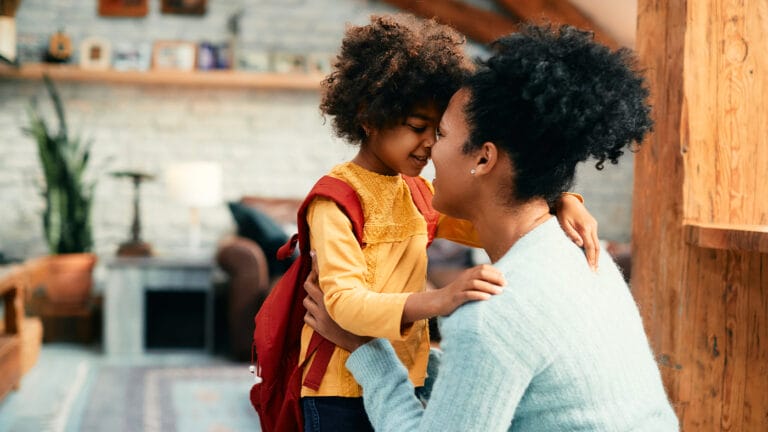What is separation anxiety?
Separation anxiety is feeling nervous about being separated from a loved one or caregiver.
Around seven months old, infants develop object permanence and understand that their parents and caregivers don’t disappear when they leave the room.
By the time they are 18 months old, young toddlers begin to wonder where their parents are and why they have gone away. This new awareness can cause separation anxiety.
You can help children at your childcare program cope with their separation anxiety by encouraging them to create a nurturing bond with an educator, helping them regulate their emotions, and reminding them that their parents or caregivers will return for them each day.
Parents who go to work drop their children off at preschool. Some get emotional when they give their children a good luck hug and kiss, while others keep it short and prompt. Knowing their children go to preschool gives them a bittersweet feeling. They feel joy because going to preschool means another milestone that their children accomplished.
Now, Rising Stride Child Care Centers shares some tips that parents may follow to help them deal with child separation anxiety during preschool drop-off.
Enthuse them about Preschool
The first thing that parents can do to manage separation anxiety is to enthuse them about preschool. Sometimes, preschool can be challenging for students, which is when parents often tell their kids about their own experiences with school. Some of those experiences may discourage kids from going. Refrain doing that.
Other conversation starters that parents need to avoid:
- Avoid sharing stories that preschool is a dreadful place to be. Refrain saying, “Yahoo! No classes tomorrow!” or, “You need to be in school, even if it’s raining!”
- Do not threaten them by saying you’ll take away their toys if they don’t stop crying.
- Lastly, avoid bribing them with treats.
It’s best to avoid arguments and instead talk about different engaging activities in school, how much fun would it be, and what books they could read.
Give them a comforting item
One of the best ways of helping them surpass separation anxiety is to let them bring their favorite item from home. It may be in the form of their favorite stuffed toy, bracelet, or an item that they have all the time.
For children, knowing that one of their favorite things is nearby helps them cope with the anxiety. They feel secure and gain peace of mind. Other times, parents give their children a piece of their own. It may be their old clip, handkerchief, or even a watch. The child holds on to it and think that they will see their parents after school.
Be more punctual than the other children
When the child arrives with all the other children in the room, this may give them a different feeling. Parents may try to send their children a little bit earlier so they’d be the first one in the room. This reduces their anxiety about talking to other children immediately, or find a spot that they liked before.
Arriving earlier than usual gives children a chance to talk to their teachers, share their thoughts about preschool, and settle in comfortably.
Walk the child through the first preschool activity
Sometimes, teachers assign activities to children and they get lost on how to do it. Before going to work, parents can teach their children on how to accomplish their homework. While sending them to preschool, parents may walk them through the center and explain what they see.
Just like when parents ask their children to throw a piece of paper in the trash, they ask how it’s done. Parents tell them to pick it up first, walk towards the trash bin, and throw it there. Similarly, that’s how things work with walking them to their classroom, talking to their teacher, and introducing the child to the teacher.
No False Promises
If you know you won’t be back to pick up your child for a few hours, don’t tell them you will check in thirty minutes afterward or wait outside in the car. Being truthful will help build trust between you and your little one, so they can know when to expect you after preschool.
Never leave without saying goodbye
Some parents tend to be in a hurry to leave for work and just drop off their child at the school lobby. When children experience this, they think their parents want to leave them there and just go as soon as possible. That cultivates their separation anxiety.
To reduce their anxiety, parents may give their children a hug and kiss before driving off. Other times, you can just say goodbye and that you’ll see them after their school. That reassures children and makes them feel loved.
Get Advice From the Teacher
Teachers are child experts. Your child’s teacher may offer them a hug and be extra comforting if they’re aware of separation anxiety over parents leaving. They may also have ideas for helping your toddler cope like giving them a job in the morning to keep them distracted, i.e. passing out toys or supplies. Don’t hesitate about scheduling an appointment to talk to them about strategies for helping your little one with the separation.
Every child reacts to separation differently. While some toddlers show their separation anxiety in the classroom, others may express it at home. Recognizing the signs of separation anxiety and helping your child adjust will allow them to become more comfortable in the classroom, and it is great preparation for the transitions they will have in the following years.

